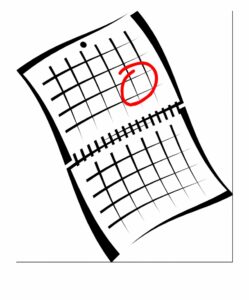Great job with all of your hard work so far this semester! Now, at the end of the semester, it’s time to access the resources you need to finish strong. Use the last few weeks of classes to catch up and keep up with your course work. Because you won’t have classes during finals, time management will be very important, creating structure for yourself and balancing time for sleep, rest, and good nutrition. Finals can be stressful and you’ll need to take care of yourself – this is a major part of preparing for any exam. Find tips and strategies for managing stress here.
The LSC is here to help you think through the steps that will work for you. Read on for resources, videos, and the top 10 tips from study skills experts and LSC tutors.
– Plan out the last few weeks of the semester using a “home-stretch calendar.” Calendars are an important tool for getting yourself organized and identifying and keeping on top of your crunch times. Block out time, especially during finals, to do things like eat, sleep, and exercise.
You may want to check out our Guidelines for Creating a Study Schedule to make your study more efficient and the Five Day Study Plan to decide when and how to study for exams.
– Having a hard time getting started? Procrastination happens to all of us, and when you understand it more you’ll have the tools to overcome it. Find out out how to break the cycle here. 
– Cornell students can self-enroll in our Canvas module on Studying for and Taking Exams for a complete step-by-step guide on what works, what doesn’t, how to develop a study plan, and strategies for taking exams. Click on the link here to self-enroll in the module. Learn about effective study strategies, concept mapping, and how to tackle different types of exam questions.
– Check out our videos on time management, the perils of multitasking, learning from online lectures and discussions, and being flexible. Find our YouTube channel here.
Advice Corner:
Tips from the LSC tutors on accessing stamina and finishing strong!
- Study a little bit of each subject every day.
- Start early.
- Eat and sleep, an exam is not worth your health.
- Take breaks to exercise, it will help you focus better while you are studying.
- Work with friends for company and motivation. Try to teach the material make sure you understand it.
- Review past prelims, especially the mistakes you made.
- Do difficult practice problems and work through them to get an answer before asking for help.
- Take practice exams under testing conditions— same time of day, format, amount of time, even the same room or building if possible.
- Have one fun thing planned each day. (Tutor suggestions: climbing wall, Trader Joe’s run, baking, Dairy Bar, pet a dog, quick walk in the Botanic Gardens.)
- Unexpected issues may arise, that’s ok, it’s just part of adulting.
- (Bonus!) To maintain a positive attitude it helps to keep the big picture in mind —what’s your “why?” Staying in touch with big-picture goals helps develop resilience.
Keep up the hard work–you got this!





